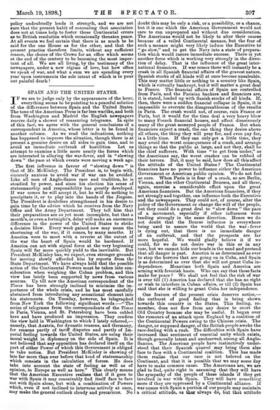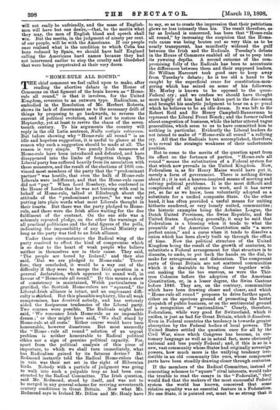SPAIN AND THE UNITED STATES.
IF we are to judge only by the appearances of the hour, everything seems to be pointing to a peaceful solution of the differences between Spain and the United States. The tone of the American Press is far less warlike, and both from Washington and Madrid the English newspapers receive daily a shower of reassuring telegrams. In spite of this fact, we agree with the general conclusions of a correspondent in America, whose letter is to be found in another column. As we read the indications, nothing has happened to improve the situation, though there is at present a genuine desire on all sides to gain time, and to avoid an immediate outbreak of hostilities. Let us attempt to examine a little more nearly the forces which are interested in allaying the war-fever, and in "slowing down" the pace at which events were moving a week ago.
The first influence in favour of "slowing down " is that of Mr. McKinley. The President is, to begin with, sincerely anxious to avoid war if war can be avoided. Like all men of Anglo-Saxon race and tradition, he is steadied by power, and since his election his sense of statesmanship and responsibility has greatly developed. If war comes he will accept it, but he will do nothing to precipitate it, or to play into the hands of the Jingoes. The President is doubtless strengthened in his desire to gain time by the advice which he receives from the Navy Office and the Army Department. They tell him that their preparations are as yet most incomplete, but that a month's, or even a fortnight's, delay will make an enormous difference in the power of the United States to strike a decisive blow. Every week gained now may mean the shortening of the war, if it comes, by many months. If America were to meet with a reverse at the outset of the war the heart of Spain would be hardened. If America can act with signal force at the very beginning Spain will far more quickly yield to the inevitable. But President McKinley has, we expect, even stronger grounds for moving slowly afforded him by reports from the State Department. We have always held that the possible action of the Continental Powers must be taken into con- sideration when weighing the Cuban problem, and this view has lately been supported by news from various sources. Up till now the American correspondent of the Times has been strongly inclined to minimise the im- portance of the whole crisis, and he has most carefully abstained from introducing any sensational element into his statements. On Tuesday, however, he telegraphed from New York the following significant words :—" The series of telegrams from the correspondents of the Times in Paris, Vienna, and St. Petersburg have been cabled here and have produced an impression. They confirm the view held in Washington to which I lately referred,— namely, that Austria, for dynastic reasons, and Germany, for reasons partly of tariff disputes and partly of Im- perial feeling towards the United States, are using their moral 'weight in diplomacy on the side of Spain. It is not believed that any opposition has declared itself on the part of either Power of which this Government is obliged to take notice. But President McKinley is showing of late far more than ever before that kind of statesmanship which consists in the calculation of forces. He does take into account the state of feeling as well as of opinion, in Europe as well as here." This clearly means that the American Executive realises that if it goes to war with Spain it may conceivably find itself face to face not with Spain alone, but with a combination of Powers which, even if not inclined to intervene actively at once, may make the general outlook cloudy and precarious. No doubt this may be only a risk, or a possibility, or a chance, but it is one which the American Government would not care to run unprepared and without due consideration. The Americans would not be likely to alter their course because of a veiled Continental menace, but the fear of such a menace might very likely induce the Executive to "go slow," and to get the Navy into a state of prepara- tion which would insure immediate success. There is yet another force which is working very strongly in the direc- tion of delay. That is the influence of the great inter- national financiers. If war comes there will instantly be a crash in all Spanish financial affairs of the gravest nature. Spanish stocks of all kinds will at once become unsaleable. This may matter little or nothing to a country like Spain, which is virtually bankrupt, but it will matter a great deal to France. The financial affairs of Spain are controlled from Paris, and the Parisian bankers and financiers are, it is stated, loaded up with Sanish stocks of all kinds. If, then, there were a sudden financial collapse in Spain, it is impossible to overrate the disagreeableness of the results in Paris. The crash would not, of course, ruin France or Paris, but it would for the time deal a very heavy blow to many French financial houses, and affect disastrously many of the great moneyed people of France. But when financiers expect a crash, the one thing they desire above all others, the thing they will pray for, and even pay for, is a little time. If they can only get a little time, they may avoid the worst consequences of a crash, and arrange things so that the public at large, and not they, shall be the chief sufferers. With time "to get from under," as the Americans say, the worst crashes can be robbed of their terrors. But, it may be said, how does all this affect the attitude of the United States ? The Continental financiers have no power to influence either the American Government or American public opinion. We do not feel so sure. When Paris is in fear of a crash, so are Berlin? Vienna, and the other Continental Bourses, and all these, again, exercise a considerable effect upon the great American financiers. But the American financiers, if they act strongly and together, can influence both the Executive and the newspapers. They could not, of course, alter the policy of the Government or change the will of the people, but they could do a great deal to "slow down" the pace of a movement, especially if other influences were tending strongly in the same direction. Hence we do not doubt that the Bourse influence is everywhere being used to assure the world that the war - fever is dying out, that there is no immediate danger of an outbreak, and that the prospects are far more hopeful. We would gladly believe it if we could, for we do not desire war in this or in any case, but we cannot hide our heads in the sand and pretend that all danger is past. America is as determined as ever to stop the horrors that are going on in Cuba, and Spain is as determined as ever that she will not grant Cuba in- dependence. Meantime both Spain and America are arming with feverish haste. Who can say that these facts make for peace ? We shall not feel that the risk of war is over till (1) America has declared that she has no right or wish to interfere in Cuban affairs, or till (2) Spain has said that she is willing to grant Cuba her independence.
One feature of the present crisis deserves notice,— the outburst of good feeling that is being shown towards this country in the States. This feeling, re- member, does not flow from any desire to court the Old Country because she may be useful. It began over the rumours of an attack upon England by a coalition of the Continental Powers owing to the Chinese crisis. The danger, or supposed danger, of the British people awoke the race-feeling with a rush. The difficulties with Spain have increased that sentiment of essential unity which exists, though generally latent and unobserved, among all Anglo- Saxons. The American people have instinctively under- stood that their Spanish quarrel may bring them also face to face with a Continental coalition. This has made them realise that our race is not beloved on the Continent, and that it is possible that we may some day have to make common cause. The Americans are, we are glad to feel, quite right in assuming that they will have the sympathy of the people of these islands if they get involved in war with Spain. They will have something more if they are oppressed by a Continental alliance. If war comes with Spain a portion of our people may maintain a critical attitude), as UAW always do, but that attitude will not really be unfriendly, and the mass of English- men will have but one desire,—that, be the merits what they may, the men of English blood and speech shall win. But the merits, in the judgment of ninety per cent. of our people, will be with the Americans. If our people once realised what is the condition to which Cuba has been reduced by Spain, we should have half England calling the Americans bard names because they had not intervened earlier to stop the cruelty and bloodshed that were being perpetrated at their very doors.







































 Previous page
Previous page